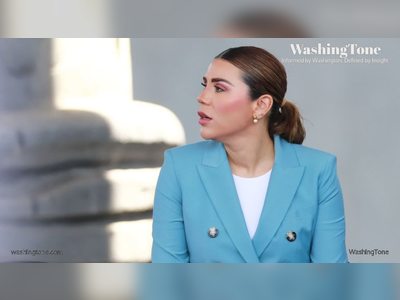White HouseSenateThe HouseSupreme CourtFederal ReserveDOJState DepartmentTreasuryCensusBudget OfficeTrade Representative
WashingTone
Informed by Washington, Defined by Insight
Tuesday, May 13, 2025
WashingTone
Brazil’s President Aims to Strengthen Ties with China Amid US Trade Tensions
Leaders of Brazil, Colombia, and Chile attend a summit in Beijing as China solidifies its role as a key partner for Latin America.
Luiz Inácio Lula da Silva, the President of Brazil, is on a four-day state visit to China, accompanied by an extensive delegation that includes 11 ministers and over 150 business leaders.
His visit coincides with similar efforts from Colombian President Gustavo Petro and Chilean President Gabriel Boric, who are also in Beijing to engage with Chinese leaders.
The backdrop to this diplomatic push includes ongoing tensions stemming from former President Donald Trump’s trade policies and tariffs, which Lula has publicly criticized.
He emphasized in his address to business leaders that he could not accept the unilateral measures that were imposed by the United States, highlighting Brazil’s aspirations to forge a robust relationship with China, which has become Brazil's largest trading partner.
During the visit, Lula announced that $4.6 billion in Chinese investments in Brazil will be forthcoming, as he seeks to attract further investment in critical infrastructure projects.
Lula’s meeting with Chinese President Xi Jinping is scheduled for Tuesday, with Xi expected to make a reciprocal visit to Brazil during the upcoming Brics summit in Rio in July.
President Petro articulated Colombia’s desire to strengthen ties with China, stating that his country should not have a one-dimensional focus toward the United States.
He reiterated the importance of deepening relations between Latin America and China.
The ongoing engagement between these South American leaders and China underscores a significant shift in regional dynamics.
In recent years, China has emerged as a dominant force in Latin America, driven by its demand for natural resources such as soybeans, iron ore, and copper.
Chinese investment has proliferated across the region, evident in the presence of companies like BYD, which manufactures electric vehicles now seen on the streets of Brazilian cities.
This diplomatic activity reflects broader trends of countries diversifying their international partnerships amid concerns over the unpredictability of U.S. foreign policy under Trump’s administration.
Observers note that the varying approaches of Unites States toward free trade compared to China’s transactional business model have prompted Latin American leaders to seek alternative alliances.
Experts point out that Lula's recent engagement with countries like Japan and Vietnam illustrates a proactive strategy to enhance Brazil’s trade opportunities at a time when the global economic landscape is rapidly evolving.
Meanwhile, the perception of a shifting global power axis towards the East suggests a potential reconfiguration of international norms that may be shaped outside of traditional Western influences.
His visit coincides with similar efforts from Colombian President Gustavo Petro and Chilean President Gabriel Boric, who are also in Beijing to engage with Chinese leaders.
The backdrop to this diplomatic push includes ongoing tensions stemming from former President Donald Trump’s trade policies and tariffs, which Lula has publicly criticized.
He emphasized in his address to business leaders that he could not accept the unilateral measures that were imposed by the United States, highlighting Brazil’s aspirations to forge a robust relationship with China, which has become Brazil's largest trading partner.
During the visit, Lula announced that $4.6 billion in Chinese investments in Brazil will be forthcoming, as he seeks to attract further investment in critical infrastructure projects.
Lula’s meeting with Chinese President Xi Jinping is scheduled for Tuesday, with Xi expected to make a reciprocal visit to Brazil during the upcoming Brics summit in Rio in July.
President Petro articulated Colombia’s desire to strengthen ties with China, stating that his country should not have a one-dimensional focus toward the United States.
He reiterated the importance of deepening relations between Latin America and China.
The ongoing engagement between these South American leaders and China underscores a significant shift in regional dynamics.
In recent years, China has emerged as a dominant force in Latin America, driven by its demand for natural resources such as soybeans, iron ore, and copper.
Chinese investment has proliferated across the region, evident in the presence of companies like BYD, which manufactures electric vehicles now seen on the streets of Brazilian cities.
This diplomatic activity reflects broader trends of countries diversifying their international partnerships amid concerns over the unpredictability of U.S. foreign policy under Trump’s administration.
Observers note that the varying approaches of Unites States toward free trade compared to China’s transactional business model have prompted Latin American leaders to seek alternative alliances.
Experts point out that Lula's recent engagement with countries like Japan and Vietnam illustrates a proactive strategy to enhance Brazil’s trade opportunities at a time when the global economic landscape is rapidly evolving.
Meanwhile, the perception of a shifting global power axis towards the East suggests a potential reconfiguration of international norms that may be shaped outside of traditional Western influences.










